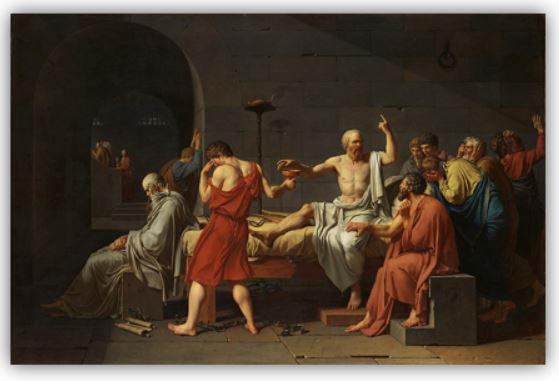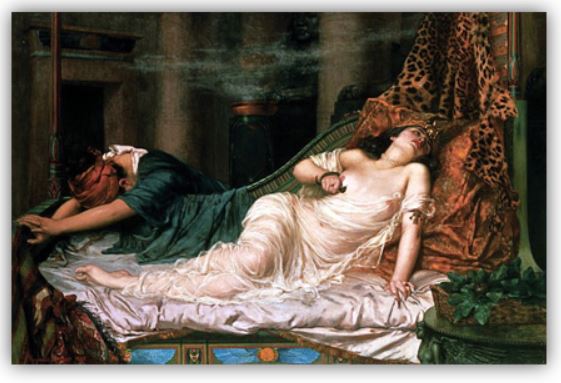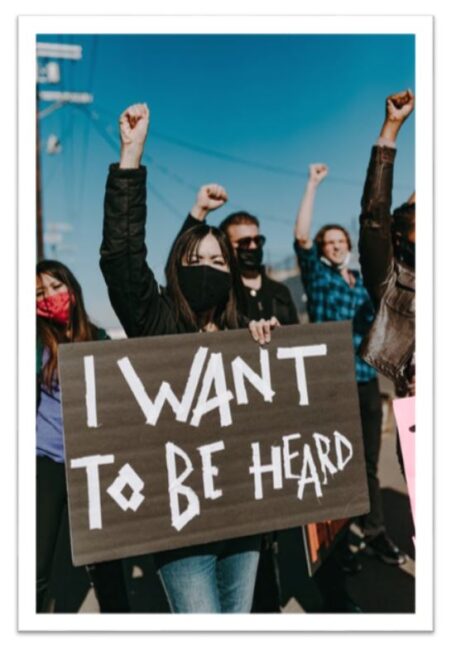Photo by RODNAE Productions from Pexels
Democracy is more perception than equation. To be heard.
More empirical than mathematical. To be respected.
More illogical* than anthropological. Know when to hold ‘em. Know when to fold ‘em.
* “Enigmatic,” like “Socratic”

Death of Socrates (Wikimedia)
Democracy falls in colors.
Country colors. City colors.
Ocean-to-ocean colors. Parochial colors.
Non-binary colors.

Death of Cleopatra (Wikimedia)
Searching for the meaning of democracy is akin to searching for the meaning of life.
And death. It’s in the lifetime of problems people face in between.
It starts with death – George Floyd – and gives birth to life.
It’s people. It’s government.
People are government, and it’s never easy.
Democracy is lamentation, aspiration, dedication, perspiration, demonstration, agitation, intelligent persuasion, and alteration. Democracy is not toothless.
Democracy is confrontation, derogation, defamation, fabrication, disinformation, consternation, fragmentation, and paralyzation. Democracy is not free. Of mendacity.
Democracy, in its dreams, is
communication
explanation
education
cooperation
adaptation
integration
harmonization and
emancipation.
But having said, let me be clear: Democracy is not, of itself, a solution to any of life’s day-to-day problems. Not a solution to life’s economic, emotional, and relationship problems. Not a solution to life’s health, safety, and pollution problems. Not a solution to catastrophe. Nor to war. Nor to pandemics. Those problems, as they occur, must be solved by minds. Wise minds. Open minds. Leadership minds. Honest minds. Scientific minds. Innovative minds. Caring minds. Human minds. It’s a crime to waste a human mind. And it’s a mistake thinking that democracy can create wisdom, great leadership, honesty and integrity, scientific understanding, or caring. Democracy can only mine them.
No. Democracy, and the politics that lives with it, are something different. They are a mechanism. One that can be used to explore for problem-solvers. Or one that can be manipulated for private ends to exacerbate problems. A mechanism that might be likened to IBM’s Deep Blue computer program, which became the world’s greatest chess player in 1997 by defeating World Chess Champion Gary Kasparov. A mechanism on a good day that will uncover and recruit the best intelligence available in the world, and the most appropriate strategies for the time, to defeat the world’s most enduring problems.
Problems of inequality. Hunger. Malnutrition. Disease. Depression. Toxic exposure. Environmental degradation. And poverty. For, the basic cause of poverty worldwide is not personal weakness, but systemic. Social orders that allow gross inequity in the sharing of earned wealth. And democracy has a lot to do with that, pro or con.
The hope is that democracy leads the way to eradicating problems like these by inspiring the people who can, to be the change the world needs. Hope. Like the aspirations expressed in our country’s own Declaration of Independence:
“We hold these truths to be self-evident, that all men are created equal, that they are endowed by their Creator with certain unalienable Rights, that among these are Life, Liberty and the pursuit of Happiness.”
Democracy at its best encompasses four basic principles –
- Free, honest, accurate, and timely elections by the people, which the electorate can trust. Ideally, the electorate includes virtually all adult citizens (save those convicted of serious crimes).
- A duty on the part of the electorate to vote, to be informed on the major issues, to speak out when necessary, to serve as watch dogs over the actions of those who are elected, and to abide by the will of the majority.
- Majority rule, with the key exception that certain fundamental human rights remain protected. Among those are the rights of life, liberty, and the pursuit of happiness, the right to be treated with dignity, the rights of freedom of belief, speech, and peaceful protest, and the right to fair and equal treatment under the law, all coupled with the right of the society to protect itself against criminal behavior.
- The rule of law, enforced by impartial and independent courts.
<The Essentials of Democracy, by Dana-Marie Seepersad>
Testing American democracy, Martin Gilens (of Princeton) and Benjamin I. Page (of Northwestern) concluded, in 2014, that the will of the people seldom has a material impact on the actions of government. Rather, it is the will of high wealth individuals and corporations, together with organized groups representing business interests.
<Testing Theories of American Politics: Elites, Interest Groups, and Average Citizens>
If this is true it might behoove those who want change to pay closer attention to elite corporate business interests. Eighty-four percent of Americans already understand that corporate spending speaks volumes louder than the average American.
<Liz Kennedy in Corporate Capture Threatens Democratic Government (2017)>
But in deciding when and where we should trust business to act in the public’s best interest, consider some of the most egregious past examples of the failure of corporate conscience: Tobacco. Leaded gasoline. PCBs. Agent Orange. Massive over-distribution of OxyContin. Production of PFOA (the toxic chemical whose story was told in the movie Dark Waters). Reluctance to put seatbelts in automobiles until mandated by federal law. Reluctance to list the nutritional content of food products until mandated by federal law. The massive emission lies of Volkswagen. And arguably even the overuse of sugar in products from cereal, to low-fat yogurt, to fruit and soft drinks.
Consider also: “[A] voluminous body of evidence has demonstrated that social class is one of the major, and perhaps even the major risk factor for disease.” Meredith Minkler (1989). Our recent COVID experience only underscores the truth of that observation.
The issue is, personal choice informed by modern science. Americans fiercely hold on to their right of individualism and their customary lifestyle. We don’t like being told what to do. Consider: Prohibition imposed on our country a hundred years ago. Mandatory seat-belt laws. Barring smoking in restaurants and most other public places. Wearing vs. not wearing COVID masks. Nutritional food requirements mandated for public schools. And possibly, soon, public denial of abortion. All of these pit democracy against tightly (maybe religiously) held beliefs of certain segments of the population.
Polls indicate that a democratic majority of Americans support protection of a woman’s choice for the first half of pregnancy and protection for the unborn fetus the second half. Sensible and strictly enforced firearms laws. Better roads. Legalized use of marijuana. More efficient help facing ever rising healthcare costs. Better educational opportunities. Access to better jobs. Guaranteed family and medical leave. More assistance to local police forces, particularly with regard to correcting perceived racial bias issues.
To my mind the most significant common-man actions our country has taken are:
A. Abolition of slavery.
B. Anti-trust laws.
C. Repeal of Prohibition.
D. Protection of workers’ rights to unionize.
E. Social Security, Medicare, Medicaid, and Affordable Health Care.
F. Civil Rights Act and Voting Rights Act.
G. The Consumer Protection Agency and the FTC.
H. Election of populist Presidents.
It is noteworthy, but hardly surprising, that for the first time in history the United States of America has been downgraded from a “full democracy” to a “flawed democracy” by The Economist Group (British) in its annual Democracy index. Due in most part to the further erosion of peoples’ trust in their elected officials in Washington.
Triggered in part by the open attack on the US Capitol this year (and continuing efforts to obfuscate its causes), there is a renewed concern for what Lincoln expressed in his Gettysburg Address –
“Four score and seven years ago our fathers brought forth on this continent, a new nation, conceived in Liberty, and dedicated to the proposition that all men are created equal. Now we are engaged in a great civil war, testing whether that nation, or any nation so conceived and dedicated, can long endure….. that government of the people, by the people, for the people, shall not perish from the earth.”
One way to destroy democracy is to destroy citizens’ belief and trust in voting. A second way is to effectively destroy citizens’ ability to access truth, by flooding the audible world with lies, propaganda, and disinformation. A third way is to cleave the populace by driving their fears. Fear and the unavoidable antagonism that runs with it bleed away the life of a democracy. We are experiencing all three, and not finding any concerted (“bipartisan”) action from government to counteract the growing threat. If anything present day political rhetoric adds fuel to the fire, making it appear even more that politicians serve their personal interest over patriotic interest. And that a large swath of the voting public seemingly supports this.
Power corrupts.
Absolute power corrupts absolutely.
And democracy is not immune from being corrupted.
So, if democracy falters, what is its best alternative? There are those, many I would guess, who could be found to tell us that what democracy needs is less democracy, and more control by great American leaders. More law and order and less protest. More unambiguous governance by those who represent “us” against “others” who have several shades of difference in religious breeding or understanding of what is “un-American.” A democracy which does its best to stay out of the way of capitalism.
Lower taxes vs. higher taxes. Laissez-faire. Property rights over social responsibility. Fault lines for tension, anxiety, and conflict among citizens of differing ideologies and different experience. Which, in the final analysis, may be the single greatest challenge for a democracy: Managing people’s tension, anxiety, and conflict.
Democracy, if it works, works best when there is general prosperity (or a realistic expectation of prosperity to come), and when there is widespread education, for education is likely the single most important factor that underpins a healthy democracy. Educated people are more committed to democratic values. Jefferson knew that.
< Threats to Democracy: Plenary Session IV, by Sidney Verba >
Democracy is precious. It is vulnerable. And, in the end, it is people and only as good as people choose to make it. It is being able to hear other people and points of view, and feel a sense of pride and unity with them even when you disagree with what they say.
The question for us, I guess, is, do we care enough? Do we care enough to keep standing up for democracy, even when it’s painful? Even when a neighbor says something about our government or our country which is painful to our ears?
“The strongest democracies flourish from frequent and lively debate, but they endure when people of every background and belief find a way to set aside smaller differences in service of a greater purpose.
When we don’t pay close attention to the decisions made by our leaders, when we fail to educate ourselves about the major issues of the day, when we choose not to make our voices and opinions heard, that’s when democracy breaks down. That’s when power is abused. That’s when the most extreme voices in our society fill the void that we leave. That’s when powerful interests and their lobbyists are most able to buy access and influence in the corridors of power – because none of us are there to speak up and stop them.
Get involved in an issue that you’re passionate about. It almost doesn’t matter what it is … We give too much of our power away, to the professional politicians, to the lobbyists, to cynicism. And our democracy suffers as a result.
Democracy cannot be imposed on any nation from the outside. Each society must search for its own path, and no path is perfect.
Part of what we have to do a better job of, if our democracy is to function in a complicated diverse society like this, is to teach our kids enough critical thinking to be able to sort out what is true and what is false, what is contestable and what is incontestable. And we seem to have trouble with that. And our political system doesn’t help.
Our predecessors understood that government could not, and should not, solve every problem…. But they also understood that the danger of too much government is matched by the perils of too little…. And they also knew that when any government measure, no matter how carefully crafted or beneficial, is subject to scorn; when any efforts to help people in need are attacked as un-American; when facts and reason are thrown overboard and only timidity passes for wisdom, and we can no longer even engage in a civil conversation with each other over the things that truly matter – that at that point we don’t merely lose our capacity to solve big challenges. We lose something essential about ourselves.
We live in a culture that discourages empathy. A culture that too often tells us our principal goal in life is to be rich, thin, young, famous, safe, and entertained.
I do have an unyielding belief that all people yearn for certain things: the ability to speak your mind and have a say in how you are governed, confidence in the rule of law and the equal administration of justice, government that is transparent and doesn’t steal from the people, the freedom to live as you choose. These are not just American ideas. They are human rights.
All of us share this world for but a brief moment in time. The question is whether we spend that time focused on what pushes us apart or whether we commit ourselves to an effort, a sustained effort to find common ground, to focus on the future we seek for our children and to respect the dignity of all human beings.
Yes, our greatness as a nation has depended on individual initiative, on a belief in the free market. But it has also depended on our sense of mutual regard for each other, of mutual responsibility.
No one is pro-abortion.
Life doesn’t count for much unless you’re willing to do your small part to leave our children – all of our children – a better world. Even if it’s difficult. Even if the work seems great. Even if we don’t get very far in our lifetime.”
I am not the author of these words above. I leave it up to you, if you’re interested, to find out who is.
But I am the author of these words:
“We are on a learning curve from which traditional democracy is at risk of falling off.
If we truly value our democracy and want it to work, here is what we have to do differently:
Tell the truth. Duh!
Don’t spread internet lies and fabrications even if they make you feel more righteous and you want to believe them.
Refrain from character assassination.
Trust is a risk; but without it life is stifled.
If you can’t trust your elected representatives, fire them.
Value honesty supremely, above success and wealth accumulation.
Value genuine humility and the patience to accept that in a democracy the other guy gets to call the shots once in a while.
No one can remove uncertainty from the equation.
Everyone has the ability to reach beyond their own egoism.
The 7 Steps to Trust are that there are no steps to trust.
A true leader is one who goes first into the jaws.”

